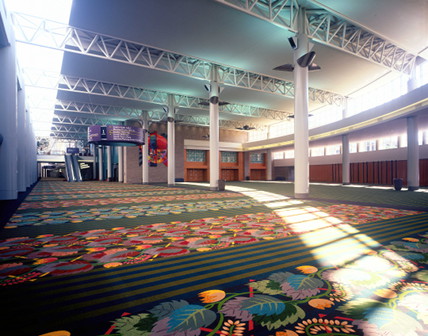A teleconference meeting on Thursday between Utah Governor Gary Herbert and several representatives of the outdoor industry apparently didn’t go so well, as both sides left the table blaming each other for the impass, and Emerald Expositions announcing that it will not include the state of Utah in the request for proposal process for future Outdoor Retailer show locations.
“Unfortunately, what we heard from Governor Herbert was more of the same. It is clear that the Governor indeed has a different perspective on the protections of public lands from that of our members and the majority of Western state voters, both Republicans and Democrats,” the Outdoor Industry Association stated after the meeting. “We are therefore continuing our search for a new home as soon as possible.”
Emerald Expositions also said it will not extend an RFP to Utah for relocating the Interbike tradeshow, which is currently held in Las Vegas, Nev.
The disagreement seems to center on differences in philosophies of how national public lands should be controlled and managed, crystalized in the debate over the designation by the Obama administration of Bears Ears National Monument and the Utah Governor’s and legislature’s request for President Trump to rescind that designation.
Ultimately, the Outdoor Industry Association, some of its members and OR executives put more faith in the federal government when it comes to protection of and access to public lands, arguing that state control in some cases “has already resulted in the outright sale or restricted access to the very public lands that have provided hunting, angling, hiking, skiing, and camping to generations of people seeking to skirt the urban hustle for the outdoors – a uniquely American experience.”
Governor Herbert, meanwhile, argues that the state and its voters are in better position to protect public lands. “Policies change from administration to administration, creating inconsistent federal lands management practices. There are instances where federal inattention to looters, invasive species and pests has harmed these precious lands,” wrote the Governor in an op-ed in the Salt Lake Tribune.
“It’s disappointing Governor Herbert and the Utah Congressional delegation are in a different place than Republican and Democratic leaders in Washington, D.C. and across the country,” stated Amy Roberts of the Outdoor Industry Association. “Both President Trump and Interior secretary nominee Ryan Zinke have stated their support for keeping public lands public and accessible by all Americans.”
In the call with Governor Herbert, the Outdoor Industry Association requested that his administration reverse its position on four items that have been the source of conflict for OIA members, citing “a long history of anti-public land sentiment and action stemming from Utah’s state and congressional officials that has led to this discussion”:
- First, OIA requested that he revoke any support for the sale or transfer of America’s public lands to the states and cease and legal action to that effect. This was in response to legislative efforts that had passed in the state house and had been championed by Rep. Chaffetz in Washington, D.C. that would have cleared the way or made it easier for states to acquire public lands.
- Second, cease on any effort to nullify the Antiquities Act, an authority that grants Congress the ability to designate public lands. Such would be the case if President Trump were to exercise through Executive Order the removal of existing public lands, and a mantra that has been voiced by the Utah delegation.
- Third, we provided an opportunity for Governor Herbert to make good on this commitment by halting any support to rescind the designation of Bears Ears area as a National Monument. A proposal that enjoyed wide bipartisan support from Utah voters and the outdoor industry.
- Lastly, the Outdoor Industry requested that the Governor embrace and actively support the outdoor recreation economy’s role in the state by supporting the public lands that provide the backbone of the industries sales. OIA shared its belief that Utah has the opportunity to change course and grow the outdoor recreation economy for the benefit of the Utah tax base and the local based business that call Utah home.
According to Herbert spokesman Paul Edwards, in an email to the Salt Lake Tribune, the Governor “offered the opportunity … to work through a negotiation process with the outdoor industry about what seem to be differences about the state’s position with regard to the use of the Antiquities Act here in the state,” referring to the federal law enabling presidents to declare national monuments.
“Instead of accepting,” Edwards said, “we felt that we were being presented with an ultimatum that there be a full rescinding of the resolution passed by the Legislature and the governor with regard to the concerns we have about the Bears Ears designation.”
Edwards called the decision to pull the show from Salt Lake, “offensive,” and said it “reflects a gross ingratitude.”
“It perpetuates the false narrative that Utah — a state that derives much of its inspiration and identity from its iconic public lands, a state that invests tens of millions of dollars into the protection of and access to its public lands — is somehow hostile to those public lands,” said Edwards in his email. “It shows how a political agenda, rather than reason or merit, seems to have captured the decision-making at the Outdoor Industry Association.”
Utah Democratic Party Chairman Peter Corroon, meanwhile, decried the state’s stand over public lands and on the Bears Ears designation.
“With one breath, Gov. Herbert touts our five, now six, national monuments to increase tourism, and with another refuses to drop the party lines for the betterment of Utah’s economy,” Corroon said in a news release.
Visit Salt Lake CEO Scott Beck took an opposing view, saying that Herbert made a good-faith effort to engage outdoor industry leaders in the call.
“I watched our governor just really put rhetoric aside and really reach across the table to start some genuine dialogue,” Beck said. “One of the things that I noted in this process, there’s been a lack of genuine dialogue.”
Salt Lake City Council member Charlie Luke took a less partisan angle, focusing on the “huge loss” for Utah businesses.
“While I have been frustrated at times with OR’s past negotiating tactics, Utah putting politics before economic development has led to the end of a successful decades-long partnership with the outdoor industry,” Luke said in a news release.
So where will the show end up? As of now, OR is signed up with the Salt Palace through Summer 2018. After that, early bets are a move to Denver, current home of SIA and a city that has been actively courting OR for some time. More to come on that …
RELATED: Will Salt Lake Divide Us?








